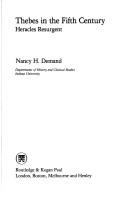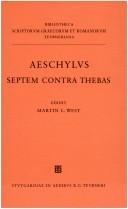| Listing 1 - 10 of 47 | << page >> |
Sort by
|
Book
ISBN: 9185058548 Year: 1973 Volume: 35 Publisher: Lund : Bloms Boktryckeri,
Abstract | Keywords | Export | Availability | Bookmark
 Loading...
Loading...Choose an application
- Reference Manager
- EndNote
- RefWorks (Direct export to RefWorks)
Thavai (Greece) --- Thebes (Greece) --- Antiquities. --- Thāvai (Greece) --- Civilization, Mycenaean --- Mycenaean civilization --- Civilization, Aegean --- Thēvai (Greece) --- Thívai (Greece) --- Thebes (Greece : Ancient city) --- Thiva (Greece) --- Thēva (Greece) --- Tebe (Greece) --- Theben (Greece) --- Thebes (Greece : Extinct city) --- Θῆβαι (Greece) --- Thēbai (Greece) --- Θήβα (Greece)

ISBN: 0710092881 9780710092885 Year: 1982 Publisher: London Routledge and Kegan Paul
Abstract | Keywords | Export | Availability | Bookmark
 Loading...
Loading...Choose an application
- Reference Manager
- EndNote
- RefWorks (Direct export to RefWorks)
Th*avai (Greece) --- Thebes (Greece) --- Civilization --- -Civilization --- Thēvai (Greece) --- Thívai (Greece) --- Thebes (Greece : Ancient city) --- Thiva (Greece) --- Thēva (Greece) --- Tebe (Greece) --- Theben (Greece) --- Thebes (Greece : Extinct city) --- Θῆβαι (Greece) --- Thēbai (Greece) --- Θήβα (Greece) --- Civilization. --- Thebes (Greece) - Civilization
Book
ISBN: 2701801176 Year: 1998 Publisher: Paris de Boccard
Abstract | Keywords | Export | Availability | Bookmark
 Loading...
Loading...Choose an application
- Reference Manager
- EndNote
- RefWorks (Direct export to RefWorks)
Cabiri --- Mysteries, Religious --- Mysteries, Religious, in art. --- Folklore --- Cult. --- Thebes (Greece) --- Antiquities. --- Mysteries, Religious, in art --- Mystery religions --- Religious mysteries --- Religion --- Secret societies --- Rites and ceremonies --- Religions --- Cult --- Thēvai (Greece) --- Thívai (Greece) --- Thebes (Greece : Ancient city) --- Thiva (Greece) --- Thēva (Greece) --- Tebe (Greece) --- Theben (Greece) --- Thebes (Greece : Extinct city) --- Θῆβαι (Greece) --- Thēbai (Greece) --- Θήβα (Greece)
Book
ISBN: 9025608949 Year: 1985 Publisher: Amsterdam Hakkert
Abstract | Keywords | Export | Availability | Bookmark
 Loading...
Loading...Choose an application
- Reference Manager
- EndNote
- RefWorks (Direct export to RefWorks)
Seven against Thebes (Greek mythology) in literature --- Andromache (Legendary character) in literature --- Euripides --- Euripide --- Eteocles (Greek mythology) --- Polyneices (Greek mythology) --- Sibling rivalry in literature --- Euripides. --- Thebes (Greece) --- Thēvai (Greece) --- Thívai (Greece) --- Thebes (Greece : Ancient city) --- Thiva (Greece) --- Thēva (Greece) --- Tebe (Greece) --- Theben (Greece) --- Thebes (Greece : Extinct city) --- Θῆβαι (Greece) --- Thēbai (Greece) --- Θήβα (Greece) --- In literature.
Book
ISBN: 9780199556922 Year: 2009 Publisher: Oxford Oxford university press
Abstract | Keywords | Export | Availability | Bookmark
 Loading...
Loading...Choose an application
- Reference Manager
- EndNote
- RefWorks (Direct export to RefWorks)
Ovid, --- Ovidius Naso, Publius. --- Rome --- Thebes (Greece) --- Thēvai (Greece) --- Thívai (Greece) --- Thebes (Greece : Ancient city) --- Thiva (Greece) --- Thēva (Greece) --- Tebe (Greece) --- Theben (Greece) --- Thebes (Greece : Extinct city) --- Θῆβαι (Greece) --- Thēbai (Greece) --- Θήβα (Greece) --- In literature.
Book
ISBN: 128219173X 9786612191732 1443808083 9781443808088 1847183549 9781847183545 Year: 2007 Publisher: Newcastle Cambridge Scholars Pub.
Abstract | Keywords | Export | Availability | Bookmark
 Loading...
Loading...Choose an application
- Reference Manager
- EndNote
- RefWorks (Direct export to RefWorks)
Publius Papinius Statius was born in Neapolis (Naples) in about AD 50. The twelve books of his magnum opus, the Thebaid, were published in ca. 92. The Achilleid was begun in ca. 95 and left unfinished at his death in ca. 96. The present work, in three volumes, offers a revised text of the two epics with an apparatus criticus (volume I), a prose translation (volume II), and an extensive secondary apparatus accompanied by discussion of the manuscripts and previous editions (volume III).
Seven against Thebes (Greek mythology) --- Epic poetry, Latin --- Thebes (Greece) --- Thēvai (Greece) --- Thívai (Greece) --- Thebes (Greece : Ancient city) --- Thiva (Greece) --- Thēva (Greece) --- Tebe (Greece) --- Theben (Greece) --- Thebes (Greece : Extinct city) --- Θῆβαι (Greece) --- Thēbai (Greece) --- Θήβα (Greece)

ISBN: 3110949857 9783110949858 3519010194 9783598710193 Year: 2013 Publisher: Berlin ; Boston : De Gruyter,
Abstract | Keywords | Export | Availability | Bookmark
 Loading...
Loading...Choose an application
- Reference Manager
- EndNote
- RefWorks (Direct export to RefWorks)
Seven against Thebes (Greek mythology) --- Greek drama (Tragedy) --- Greek drama --- Thebes (Greece) --- Thēvai (Greece) --- Thívai (Greece) --- Thebes (Greece : Ancient city) --- Thiva (Greece) --- Thēva (Greece) --- Tebe (Greece) --- Theben (Greece) --- Thebes (Greece : Extinct city) --- Θῆβαι (Greece) --- Thēbai (Greece) --- Θήβα (Greece)
Book
ISBN: 1282191748 9786612191749 1443808091 9781443808095 1847184901 9781847184900 9781282191747 6612191740 Year: 2008 Publisher: Newcastle : Cambridge Scholars Pub.,
Abstract | Keywords | Export | Availability | Bookmark
 Loading...
Loading...Choose an application
- Reference Manager
- EndNote
- RefWorks (Direct export to RefWorks)
Volume III of the present work on Statius' Thebaid and Achilleid is divided into two parts. The first part offers a sketch of the history of the textual transmission, a complete list of manuscripts, discussion of various previous editions, exposition of the views about the manuscripts which underly the present edition, and an orthographical index. The second part comprises a secondary apparatus, which tabulates further evidence from the manuscripts and all conjectures not recorded in the ...
Seven against Thebes (Greek mythology) --- Epic poetry, Latin --- Thebes (Greece) --- Thēvai (Greece) --- Thívai (Greece) --- Thebes (Greece : Ancient city) --- Thiva (Greece) --- Thēva (Greece) --- Tebe (Greece) --- Theben (Greece) --- Thebes (Greece : Extinct city) --- Θῆβαι (Greece) --- Thēbai (Greece) --- Θήβα (Greece)
Book
ISBN: 9788862746656 8862746652 Year: 2016 Publisher: Alessandria Edizioni dell'Orso
Abstract | Keywords | Export | Availability | Bookmark
 Loading...
Loading...Choose an application
- Reference Manager
- EndNote
- RefWorks (Direct export to RefWorks)
Mimesis in literature --- Representation (Literature) --- Imitation in literature --- Realism in literature --- Aeschylus. --- Thebes (Greece) --- Thēvai (Greece) --- Thívai (Greece) --- Thebes (Greece : Ancient city) --- Thiva (Greece) --- Thēva (Greece) --- Tebe (Greece) --- Theben (Greece) --- Thebes (Greece : Extinct city) --- Θῆβαι (Greece) --- Thēbai (Greece) --- Θήβα (Greece) --- In literature. --- Aeschylus --- Mimesis in literature.
Book
ISBN: 1316255840 1316236927 1316253945 1316250164 1316252051 1316235033 1316248275 1139924869 1107077362 110743436X Year: 2015 Publisher: Cambridge : Cambridge University Press,
Abstract | Keywords | Export | Availability | Bookmark
 Loading...
Loading...Choose an application
- Reference Manager
- EndNote
- RefWorks (Direct export to RefWorks)
How does a city's legendary past affect its present? Thebes remains a city with one of the richest traditions of myth in all of Greece - it was the home of Cadmus, Oedipus, and Hercules, and the traditional birthplace of Dionysus. The city's topography, both natural and built, very often plays a significant role in its myths. By focusing on Greek literature ranging from the oral epics to the travel writing of the Roman Empire, this book explores the relationship between the city's spaces as they were represented in the Greek literary tradition and the physical realities of a developing city that had been continuously inhabited since at least the second millennium BC. Spurred on especially by the city's catastrophic sack by Alexander the Great in 335 BC, the urban topography of Thebes came more and more to reflect the literary, even fictional, constructions of its mythic past.
Classical literature --- History and criticism. --- Thebes (Greece) --- Thēvai (Greece) --- Thívai (Greece) --- Thebes (Greece : Ancient city) --- Thiva (Greece) --- Thēva (Greece) --- Tebe (Greece) --- Theben (Greece) --- Thebes (Greece : Extinct city) --- Θῆβαι (Greece) --- Thēbai (Greece) --- Θήβα (Greece) --- In literature.
| Listing 1 - 10 of 47 | << page >> |
Sort by
|

 Search
Search Feedback
Feedback About UniCat
About UniCat  Help
Help News
News